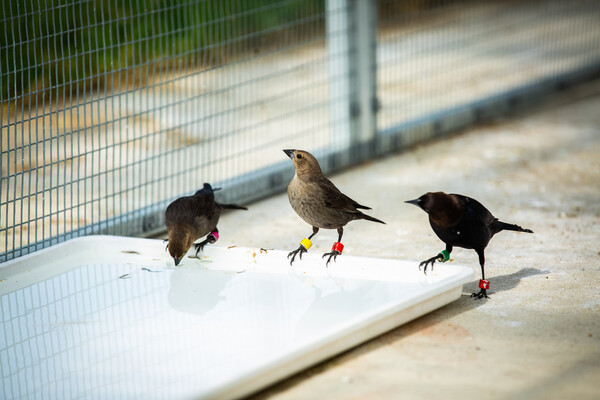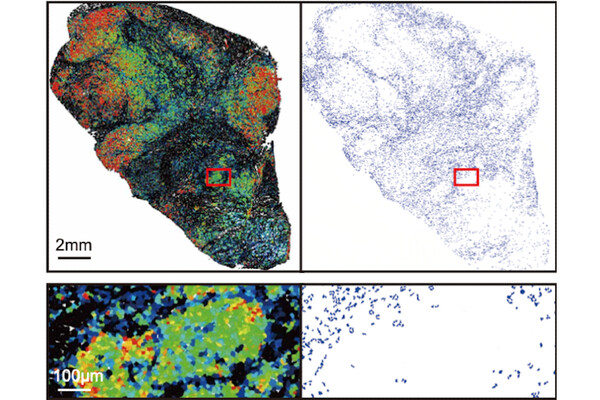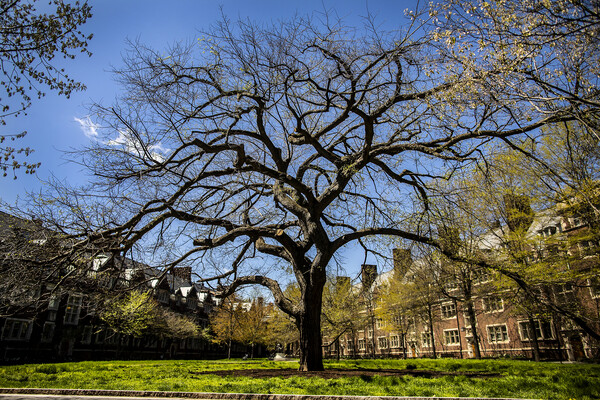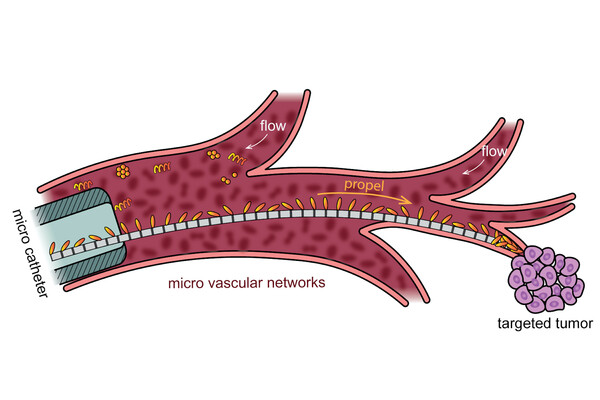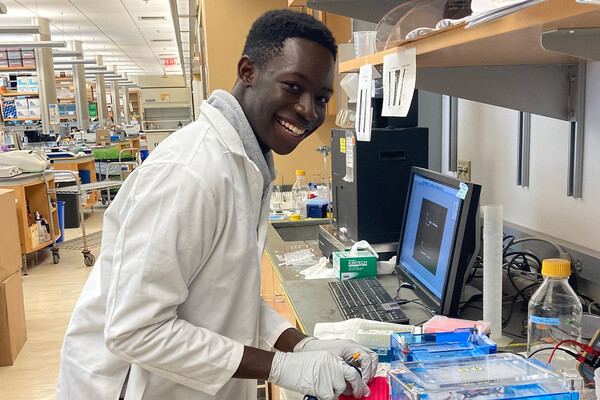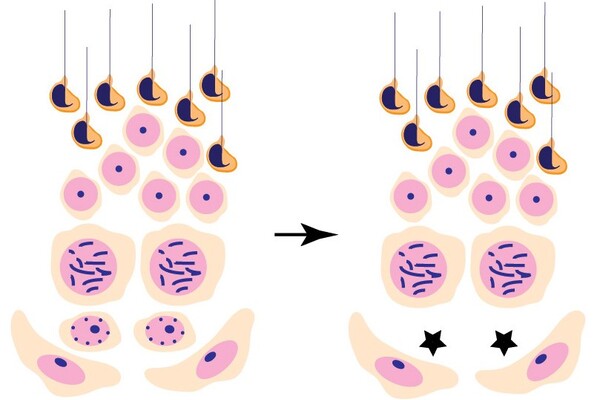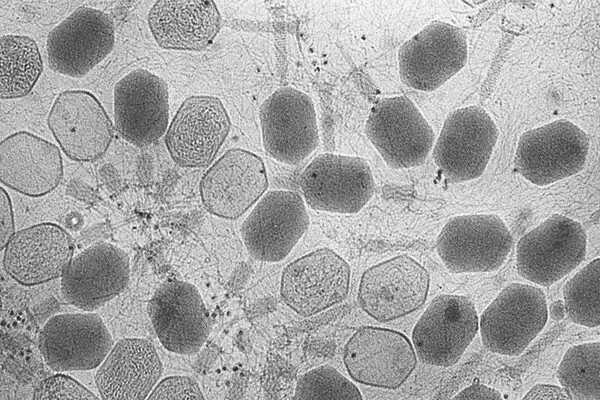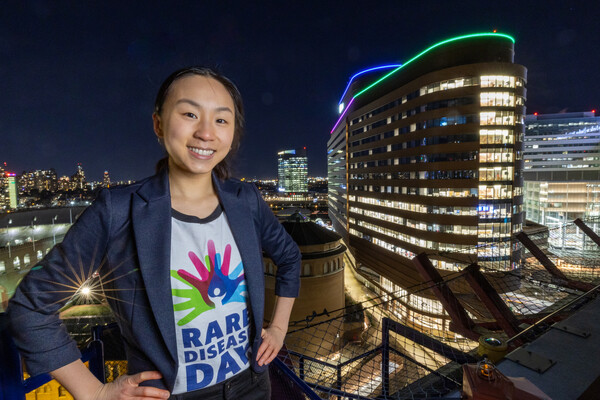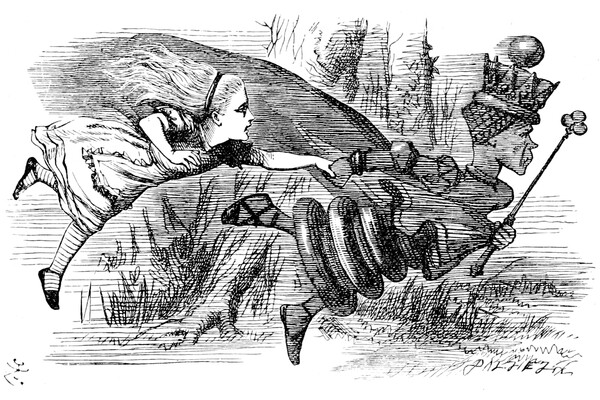4/22
Biology
Undergraduates help songbird research project take flight
Through the PURM internship program, Julia Youngman and Eric Tao had the opportunity to work in neuroethologist Marc Schmidt’s lab studying the neural basis of courtship behaviors in songbirds.
Cancer cells selectively load ‘drones’ to keep T cells from infiltrating tumors
Biologist Wei Guo and colleagues elucidate the process of sorting and loading cargo for these biological drones with implications for a more targeted and effective use of checkpoint inhibitor drugs in cancer treatment.
Goodbye to an iconic tree
More than a century old, the American elm located in the heart of the Quadrangle residences has been ailing and is due to be removed the week of July 25. The site will be replanted at a later date with three native white oaks.
Inspired by nature, artificial microtubules can work against a current to transport tiny cargoes
Technology developed by Arnold Mathijssen of the School of Arts & Sciences and colleagues could one day clear blockages in blood vessels or precisely target chemotherapy drugs to a tumor.
Educating community-oriented biologists
Mecky Pohlschröder of the School of Arts & Sciences reflects on an SNF Paideia course that connects research conducted in the STEM field to the broader community, allowing students to observe the influences of their work outside of the lab.
A newly identified stem cell regulator enables lifelong sperm production
Research led by Jeremy Wang of the School of Veterinary Medicine has discovered that the enzyme DOT1L, a stem cell renewal factor, is essential for mice to produce sperm throughout their adult lives.
A $365 million development will expand the life sciences hub at Pennovation Works
Penn Senior Executive Vice President Craig Carnaroli speaks with Penn Today about the evolution of the research and manufacturing project, led by Longfellow Real Estate Developers, and its value for Penn and the region.
How bacteria store information to kill viruses (but not themselves)
Researchers from the School of Arts & Sciences have discovered that the balance between fighting viruses and avoiding autoimmunity has a key role in shaping how bacteria “remember” old infections.
Lighting the way for rare disease
After finding out about STAC3, a rare disease without a cure, biology major Magnolia Wang of the College of Arts and Sciences set out to raise awareness and advocate for those struggling with the illness.
An arms race that plays out in a single genome
School of Arts & Sciences biologist Mia Levine and Cara Brand, a postdoc, shed light on an example of coevolution in fruit flies that has implications for human health.
In the News
When is the best time to take L-theanine—morning or night?
According to Colleen Tewksbury of the School of Nursing, research suggests that L-theanine may help support stress management, sleep, and potentially weight management.
FULL STORY →
Is the flu shot market a slam dunk for mRNA vaccines? Experts aren’t so sure
Scott Hensley of the Perelman School of Medicine is working on a flu vaccine to provide protection against 20 subtypes of flu that may pose a pandemic threat in the future.
FULL STORY →
Thanks, Neanderthals: How our ancient relatives could help find new antibiotics
A study by César de la Fuente of the Perelman School of Medicine and colleagues used AI to recreate molecules from ancient humans that could be potential candidates for antimicrobial treatments.
FULL STORY →
Long COVID brain fog may originate in a surprising place, say scientists
A study by Christoph Thaiss and Maayan Levy of the Perelman School of Medicine and colleagues finds that long COVID’s neurological symptoms, like brain fog, memory loss, and fatigue, may stem from serotonin reduction.
FULL STORY →
Long COVID research is in its ‘most hopeful’ phase yet
A study by Christoph Thaiss and Maayan Levy of the Perelman School of Medicine and colleagues suggests that serotonin could be a target for long COVID treatment.
FULL STORY →
A crucial pattern behind long COVID may have been identified
A study by Christoph Thaiss and Maayan Levy of the Perelman School of Medicine and colleagues suggests that several current hypotheses for the pathophysiology of long COVID are linked by a single pathway that is connected by serotonin reduction.
FULL STORY →




